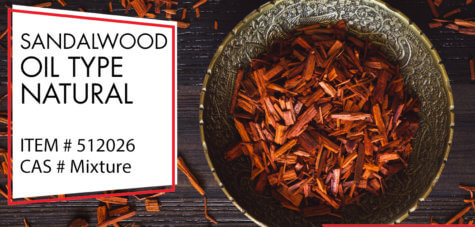Sandalwood Oil Natural Type
Item#: 512026 CAS: Mixture
Odor Strength: Medium
Odor Description: Woody, balsamic, sweet, incense
Sandalwood oil is one of the most coveted extracts in the fragrance industry. Sandalwood, as the name suggests, is a woody extract that is most often used as a fixative base note. It is often described as woody, sweet, and pleasantly balsamic. It is used in cult favorites such as Le Labo’s Santal 33, Chanel’s Coco Eau de Parfum, and Byredo’s Blanche.
The sizeable price tag on sandalwood essential oil is completely understandable when one examines the process by which the extract is produced. From planting the seed of the tree to the first drop of oil produced- sandalwood essential oil is labor of love. Sandalwood is native to India and Asia. Today, the majority of sandalwood is still grown in these regions, with the most sought after oil coming from the Mysore (Mysuru) region of India.
In the beginning phases of its growth, sandalwood trees are actually parasitic, leaching nutrients directly from the roots of other trees around them. This does not drastically damage the host tree. It takes roughly 30 years for sandalwood to reach proper maturity for essential oil extraction. Still, the highest quality sandalwood oil comes from trees that are upwards of 60 years old. In general, the older the wood is, the more precious the essential oil distilled from it.
Sandalwood actually has a an incredibly rich history due to its rare nature and arduous production process. In the late 1990s, sandalwood production in India was booming- to an unsustainable degree. The manufacturing and growth of the trees was posing a huge threat to the environment. The Indian environment actually banned the production of sandalwood oil soon after. Like many instances where government prohibits a good, black market manufacturing & organized crime surrounding the extract plagued India. Veerappan- a notorious leader of these crimes- was actually executed by the Indian government for his involvement.
When discussing Sandalwood, it is important to acknowledge the differences between the various varieties of the extract. Oil extacted from Santalum album is the variety that is typically preferred by perfumers. It is the species of sandalwood grown in Mysore and is known for its creamy, sweet, and woody scent. In more recent years, a production of Santalum Spicatum began in India. Australian sandalwood oil is produced more sustainably, but it is not a perfect match for the original Santalum album from mysore. The Australian extract possesses a slightly animalic note- reading leathery or haylike to some. To counter this, Australian sandalwood is often double distilled to create an extract with an aroma much closer to its Indian counterpart. Frontrunners in the F&F industry, such as Symrise and Givaudan have also been quite successful in the production of high quality synthetic substitutes for Sandalwood oil.
To prepare for oil extraction, the entire sandalwood tree is uprooted- meaning just a single batch of sandalwood oil takes at least 30 years to produce. The wood and roots of the tree are pulverized to a powder in order to maximize oil yield. Then, a steam distillation is conducted to extract the oil. Sandalwood essential oil is high in fragrance compounds such as alpha santalol and beta santalol.
Perfumers use sandalwood essential oil as a fixative base to create a woody foundation for fragrances. It blends with accords such as jasmine, rose, vanilla, and lavender to enhance powdery sweet notes in feminine scents. For woody men’s formulations, sandalwood blends with vetiver, tobacco, and amber. It also is used in variations of chypre style formulations, featuring bergamot, amber, and oakmoss.
For years, sandalwood has been used in casual aromatherapy in the home and ceremonial, sacred practices in India and Asia. Sandalwood oil past perfumed the incense that burned in many religious temples across the East. The oil has been used historically in a number of religious rituals and practices as well. Today, is thought to have a clarifying effect when diffused and is packed with benefits for the hair and skin.
Vigon’s Sandalwood Oil Type Natural
If you are interested in seeing a sample or placing an order, please email Nicholas Bourne at nbourne@vigon.com or call 570-422-6026.

